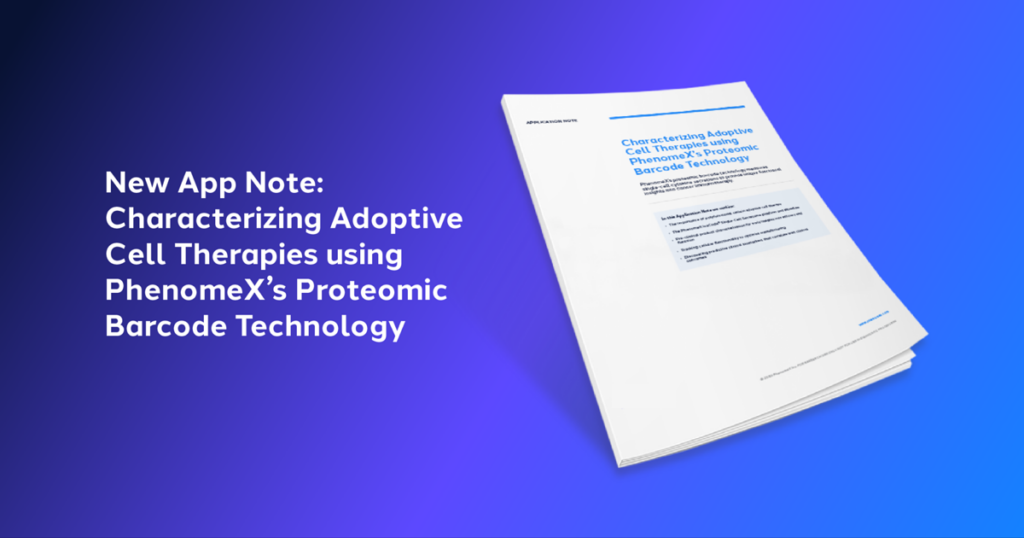Cancer treatments have come a long way in recent years, and adoptive cell therapy (ACT) is at the forefront of this transformation. With promising therapies such as CAR-T, CAR-NK, TCR-T and TIL, ACT is providing renewed hope and improved outcomes for patients.
Still, there’s more work to be done. To fully comprehend the potency of cells in ACT, it’s critical to characterize polyfunctional cells that secrete multiple cytokines and indicate cellular strength and function. But until recently, such characterization has been hindered by a lack of innovative technology.
Bruker Cellular Analysis’ IsoCode Single-Cell Secretome Platform: The Key to Highly Multiplexed Functional Analysis
Bruker Cellular Analysis is dedicated to accelerating insights into cell function and behavior, vital to advancing cancer immunotherapy discoveries. That’s why we’ve developed the IsoCode Single-Cell Secretome platform—a unique in vitro system that automates the detection of up to 32 cytokines secreted from individual single cells using microchambers and Proteomic Barcode Technology. With this groundbreaking technology, identifying and characterizing potent polyfunctional cells is now possible.
To gain an overall view of immune fitness when analyzing starting materials, a general stimulation such as PMA/lonomycin, anti CD3/CD28 for T cells, or R848 for NK cells can be utilized. After genetic engineering and retargeting, co-culture stimulation becomes increasingly important. The platform can use a relevant target cell expressing the target tumor antigen for CAR-T or target peptide pulsed cells for TCR-T to mimic physiologically relevant scenarios.
Empowering ACT Development at Every Research Stage
The IsoCode Single-Cell Secretome platform is a versatile tool that can help answer impactful questions at every stage of the ACT development process. In our latest application note, we outline specific case studies that utilize Bruker Cellular Analysis technology to unveil significant single-cell insights.
- Preclinical stage: By using in vitro and in vivo animal models, researchers can explore and test modifications, techniques, and designs. This stage is crucial to identifying promising targets and treatment approaches, as well as characterizing their function.
- Manufacturing optimization: Achieving consistency, scalability and functionality are key during this stage, which often involves exploring new techniques and compounds that can affect functional phenotypes.
- Clinical studies: This stage is necessary to evaluate the performance of the ACT in humans, particularly because donor heterogeneity can result in product and response heterogeneity, necessitating a deeper understanding of ACT performance through clinical biomarkers.
Real-world Case Studies Highlight IsoCode Platform’s Effectiveness in ACT Development
Preclinical Characterization
The power of Bruker Cellular Analysis technology provides researchers early insight into the functional consequences of their choices. It has been featured in several high impact publications including Gastroenterology, Nature and Nature Biotechnology highlighting that it can identify the best performing candidate, help researchers obtain early insight into downstream clinical results and allowed scientists to characterize the effect of product modifications.
Manufacturing Optimization
When scientists are looking to optimize manufacturing processes, polyfunctionality metrics can track a key measure of potency. This has been demonstrated in several recent studies published in Frontiers in Medical Technology and Nature Communications in which researchers were able to define the effect of new techniques as well as optimize cell expansion strategies by using Bruker Cellular Analysis technology.
Clinical Biomarker Discovery and Immunomonitoring
Bruker Cellular Analysis’ technology has been shown to reveal insightful biomarkers that correlate with clinical outcomes by capturing patient heterogeneity at the single-cell level. In recent papers published in Blood, Science Advances, and Nature Medicine, researchers were able to identify biomarkers that correlate with clinical metrics, pinpoint cytokine drivers of clinical response as well as track performance of immunomonitoring—all with the use of Bruker Cellular Analysis’ technology.
Accessible Insights for Significant Outcomes
The successful development of ACTs requires deep knowledge of cellular behavior, which can only be obtained from single-cell functional proteomics. Bruker Cellular Analysis’ IsoCode platform delivers a fully automated system that makes single-cell functional proteomics more accessible. The platform produces valuable metrics that have been shown to correlate with significant outcomes in preclinical, manufacturing and clinical settings. By utilizing Bruker Cellular Analysis’ technology, researchers can gain insights into the complexities of cellular behavior, leading to the development of more effective ACTs and better patient outcomes.
Interested in learning how the IsoCode platform can help you gain better and more accessible insights into your research? Download our application note today.


